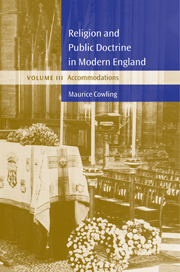Book contents
- Frontmatter
- Contents
- Foreword and acknowledgements
- Introduction
- I The Christian intellect and modern thought in modern England
- II The post-Christian consensus
- 15 Modern knowledge and the post-Christian consensus I
- 16 Modern knowledge and the post-Christian consensus II
- 17 Modern knowledge and the post-Christian consensus III
- 18 Modern knowledge and the post-Christian consensus IV
- 19 English Socialism as English religion
- 20 Literature and the post-Christian consensus
- 21 Modern knowledge and the post-Christian consensus V
- 22 Modern knowledge and the post-Christian consensus VI
- 23 Judaism and the post-Christian consensus
- III Conclusion: religion and public doctrine in modern England
- Notes
- Index of proper names
15 - Modern knowledge and the post-Christian consensus I
Published online by Cambridge University Press: 23 December 2009
- Frontmatter
- Contents
- Foreword and acknowledgements
- Introduction
- I The Christian intellect and modern thought in modern England
- II The post-Christian consensus
- 15 Modern knowledge and the post-Christian consensus I
- 16 Modern knowledge and the post-Christian consensus II
- 17 Modern knowledge and the post-Christian consensus III
- 18 Modern knowledge and the post-Christian consensus IV
- 19 English Socialism as English religion
- 20 Literature and the post-Christian consensus
- 21 Modern knowledge and the post-Christian consensus V
- 22 Modern knowledge and the post-Christian consensus VI
- 23 Judaism and the post-Christian consensus
- III Conclusion: religion and public doctrine in modern England
- Notes
- Index of proper names
Summary
The conclusions arrived at in this work will be denounced by some as highly irreligious; but he who thus denounces them is bound to show why it is more irreligious to explain the origin of man as a distinct species by descent from some lower form, through the laws of variation and natural selection, than to explain the birth of the individual through the laws of ordinary reproduction. The birth both of the species and of the individual are equally parts of that grand sequence of events, which our minds refuse to accept as the result of blind chance.
(Charles Darwin, The Descent of Man, 1871, 1981 edn, vol. II, pp. 395–6)It is easy to see how the man who has time for education, for self-culture, may strive towards the freethinker's standard of morality. But what about the toiler, the man whose days are spent in the hard round of purely mechanical labour? I can only reply that so long as such a man has no time for the development of his intellectual nature he cannot be moral in my sense of the word … The existence of large masses of men in our present society incapable of moral action is one of the gravest questions of the time … Here the freethinker's mission is at once religious and moral! His morality … his socialism, his religious cult is the pursuit of truth.
(Karl Pearson, The Enthusiasm of the Market-Place and of the Study, 1885, in The Ethic of Freethought, 1888, pp. 127–8)- Type
- Chapter
- Information
- Religion and Public Doctrine in Modern England , pp. 391 - 410Publisher: Cambridge University PressPrint publication year: 2001

